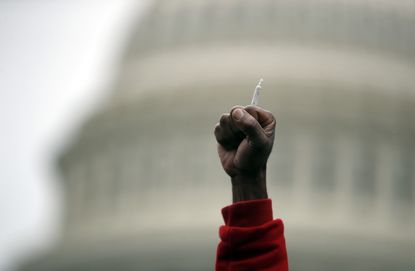Marijuana legalization is the next great winning issue for Democrats
Ditch the antiquated drug warrior nonsense and light up


Marijuana is under attack.
Attorney General Jeff Sessions is ending former President Barack Obama's policy of allowing states to experiment with their own legal marijuana proposals. Instead, the issue will be left up to local U.S. attorneys, most of whom have been appointed by President Trump. At least some of the state-level experiments in fully legalized marijuana are at risk of going up in flames.
Sessions is a longtime opponent of marijuana, so no one should really be surprised that he's going after legal pot. Still, it's a terrible new policy — and it opens up a big, easy opportunity for Democrats, who must ditch their antiquated drug warrior baggage and join Sen. Cory Booker (D-N.J.) in getting behind legal marijuana immediately.
Subscribe to The Week
Escape your echo chamber. Get the facts behind the news, plus analysis from multiple perspectives.

Sign up for The Week's Free Newsletters
From our morning news briefing to a weekly Good News Newsletter, get the best of The Week delivered directly to your inbox.
From our morning news briefing to a weekly Good News Newsletter, get the best of The Week delivered directly to your inbox.
For one thing, legal marijuana is extremely popular, and getting more so by the minute. Gallup's poll shows support for legalization increasing from 40 percent in 2008 to 64 percent as of October 2017. It's also an excellent issue for driving youth turnout — support has increased among all age cohorts, but especially among millennials, 71 percent of whom supported legalization in October 2016.
For another, it's the right thing to do on the policy merits. Getting marijuana out of the black market would be a huge blow against crime and violence — especially in Latin America, where it would take away a significant revenue stream from drug gangs. Legalization would drastically reduce structural racism in the criminal justice system, as minorities are arrested and imprisoned at vastly higher rates for marijuana possession despite similar rates of use across races (and it goes without saying that any legalization policy must include a blanket pardon for any person currently incarcerated for marijuana-only crime).
Legalization would also provide universal access to a pretty excellent medication that can treat all manner of disorders, from nausea to chronic pain to perhaps even opioid addiction.
Finally, of course, basic liberal principles suggest that citizens of a free society ought to be allowed to do what they like, so long as the negative social side effects are not too bad. Marijuana is not even one-tenth as dangerous as alcohol or tobacco, and the fact that they are legal while it is classified alongside heroin in Schedule I of the Controlled Substances Act reveals American drug laws to be the travesty of medicine and science they in fact are.
However, that doesn't mean that marijuana ought to be opened up to full capitalist production. As I've argued before, it ought to be regulated extremely strictly so as to keep it a small craft production — with high taxes, no advertising, no sales across state lines, businesses kept small, and so on. We've had more than enough trouble with Big Tobacco and Big Alcohol (not to mention Big Opioid turning West Virginia into a hellish corpse-strewn addiction factory) to allow another huge business in drug production to develop.
Indeed, wise federal policy could preempt state-level development of a Big Pot lobbying sector. California is preparing to go ahead with a legalization scheme, and with nearly 40 million residents could easily develop its own huge pot industry if it isn't careful.
All of this means Democrats would have to ditch another failed aspect of President Obama's legacy. In his first term, Obama was an unqualified disaster on weed. After promising during the campaign that he would leave state-level medical marijuana alone — and issuing an official memo from the Department of Justice to that effect — his administration abruptly reversed course in 2011 and sicced federal drug cops and prosecutors on hundreds of marijuana growers and even state employees involved in marijuana regulation.
In his second term, the administration reversed course again, issuing the guidelines to allow states a kinda-sorta exception to federal drug laws (which Sessions is now shredding) that clearly state marijuana is still highly illegal. It was so tenuous that banks wouldn't work with new pot businesses, requiring extremely burdensome and dangerous cash-only operations. Given the scientifically preposterous placement of marijuana in Schedule I, Obama almost certainly could have directed it be placed in Schedule II or III, thus strengthening state-level legalization schemes — but he chose not to.
But it is perhaps even more important to ditch the old Democratic drug warrior instincts, which Obama also had. Despite the fact that he admitted to smoking quite a lot of weed as a young man and turned out fine, he consistently adopted a prissy, moralizing tone when talking about it as president. When speaking to The New Yorker's David Remnick in 2014, he lectured that legalization was not a clear-cut issue; in 2015 he hectored the (basically non-existent) cohort of young people who supposedly rate it as more important than climate change or war.
In that, as in many other respects, President Obama was more concerned with performing bourgeois morality than he was with careful policy consideration. But in reality, legal marijuana is perhaps the easiest and most obvious political and policy win that exists. Democrats need to pick it up, now.
Sign up for Today's Best Articles in your inbox
A free daily email with the biggest news stories of the day – and the best features from TheWeek.com
Ryan Cooper is a national correspondent at TheWeek.com. His work has appeared in the Washington Monthly, The New Republic, and the Washington Post.
-
 Today's political cartoons - December 22, 2024
Today's political cartoons - December 22, 2024Cartoons Sunday's cartoons - the long and short of it, trigger finger, and more
By The Week US Published
-
 5 hilariously spirited cartoons about the spirit of Christmas
5 hilariously spirited cartoons about the spirit of ChristmasCartoons Artists take on excuses, pardons, and more
By The Week US Published
-
 Inside the house of Assad
Inside the house of AssadThe Explainer Bashar al-Assad and his father, Hafez, ruled Syria for more than half a century but how did one family achieve and maintain power?
By The Week UK Published
-
 US election: who the billionaires are backing
US election: who the billionaires are backingThe Explainer More have endorsed Kamala Harris than Donald Trump, but among the 'ultra-rich' the split is more even
By Harriet Marsden, The Week UK Published
-
 US election: where things stand with one week to go
US election: where things stand with one week to goThe Explainer Harris' lead in the polls has been narrowing in Trump's favour, but her campaign remains 'cautiously optimistic'
By Harriet Marsden, The Week UK Published
-
 Is Trump okay?
Is Trump okay?Today's Big Question Former president's mental fitness and alleged cognitive decline firmly back in the spotlight after 'bizarre' town hall event
By Harriet Marsden, The Week UK Published
-
 The life and times of Kamala Harris
The life and times of Kamala HarrisThe Explainer The vice-president is narrowly leading the race to become the next US president. How did she get to where she is now?
By The Week UK Published
-
 Will 'weirdly civil' VP debate move dial in US election?
Will 'weirdly civil' VP debate move dial in US election?Today's Big Question 'Diametrically opposed' candidates showed 'a lot of commonality' on some issues, but offered competing visions for America's future and democracy
By Harriet Marsden, The Week UK Published
-
 1 of 6 'Trump Train' drivers liable in Biden bus blockade
1 of 6 'Trump Train' drivers liable in Biden bus blockadeSpeed Read Only one of the accused was found liable in the case concerning the deliberate slowing of a 2020 Biden campaign bus
By Peter Weber, The Week US Published
-
 How could J.D. Vance impact the special relationship?
How could J.D. Vance impact the special relationship?Today's Big Question Trump's hawkish pick for VP said UK is the first 'truly Islamist country' with a nuclear weapon
By Harriet Marsden, The Week UK Published
-
 Biden, Trump urge calm after assassination attempt
Biden, Trump urge calm after assassination attemptSpeed Reads A 20-year-old gunman grazed Trump's ear and fatally shot a rally attendee on Saturday
By Peter Weber, The Week US Published